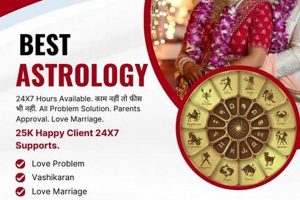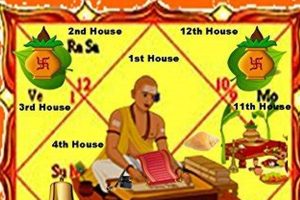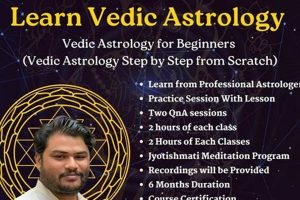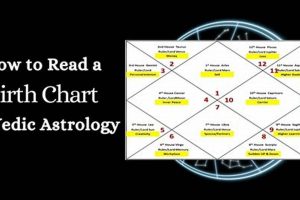Structured learning experiences delivered via the internet offer a convenient and accessible method for studying the ancient Indian system of astrology known as Vedic Astrology. These programs typically provide a curriculum encompassing foundational principles, planetary influences, predictive techniques, and chart interpretation. An example might include modules on the zodiac signs, the Nakshatras (lunar mansions), and the application of astrological remedies.
Studying this complex subject through digital platforms offers significant advantages. It allows students to learn at their own pace, revisit materials as needed, and often connect with instructors and fellow learners from around the globe. This accessibility democratizes access to knowledge previously confined to traditional gurus and geographic limitations. Furthermore, a well-designed curriculum can provide a systematic approach to understanding the philosophical underpinnings and practical applications of this ancient tradition, fostering personal growth and a deeper understanding of cosmic influences.
This exploration will delve into the key components of these programs, examining curriculum structures, instructor credentials, the benefits of online learning in this context, and factors to consider when selecting a reputable course provider. Further discussion will explore the rising popularity of this ancient practice in the digital age and its potential to provide valuable insights into individual lives and the world around us.
Tips for Studying Vedic Astrology Online
Successful navigation of online Vedic astrology courses requires careful planning and dedicated effort. The following tips offer guidance for maximizing the learning experience.
Tip 1: Research Course Providers Thoroughly: Investigate the credentials and experience of instructors, examining their lineage and reputation within the astrological community. Look for programs offering comprehensive curricula covering both foundational principles and advanced techniques.
Tip 2: Establish a Dedicated Study Space: Create a quiet, distraction-free environment conducive to focused learning. This dedicated space will enhance concentration and facilitate deeper immersion in the subject matter.
Tip 3: Manage Time Effectively: Develop a realistic study schedule that aligns with personal commitments. Consistent engagement with the material is crucial for comprehension and retention.
Tip 4: Engage Actively in Online Forums and Discussions: Utilize online platforms to connect with fellow students and instructors. Participating in discussions and asking questions can clarify complex concepts and broaden understanding.
Tip 5: Practice Chart Interpretation Regularly: Applying learned principles through chart analysis is essential for developing practical skills. Seek opportunities to analyze birth charts and explore real-world applications of astrological techniques.
Tip 6: Supplement Online Learning with Reputable Texts: Expand knowledge and deepen understanding by exploring recommended books and resources on Vedic astrology. This supplementary study can enrich the learning experience and provide diverse perspectives.
Tip 7: Maintain a Skeptical and Discerning Mindset: Approach the study of Vedic astrology with intellectual curiosity and critical thinking. Evaluate information carefully and avoid blind acceptance of all presented concepts.
By implementing these strategies, students can cultivate a strong foundation in Vedic astrology and maximize the benefits of online learning. Consistent effort, active engagement, and a discerning approach will contribute significantly to a rewarding educational journey.
These practical tips pave the way for a more enriching experience, allowing students to unlock the potential of this ancient system of knowledge. The following section concludes this exploration by summarizing key takeaways and highlighting the transformative potential of Vedic astrology.
1. Accessibility
Accessibility represents a significant advantage of online Vedic astrology courses, dismantling geographical barriers and expanding access to this ancient knowledge system. Traditional learning often required physical proximity to a guru or specific institution, limiting opportunities for many individuals. Online platforms eliminate this constraint, enabling students from diverse locations and backgrounds to engage with the subject matter. For instance, individuals residing in areas with limited access to qualified instructors can now participate in comprehensive programs led by experts from anywhere in the world. This democratization of knowledge empowers a global community of learners, fostering a richer and more diverse exchange of perspectives.
Furthermore, online learning accommodates diverse learning styles and schedules. The flexibility of asynchronous learning allows students to access materials at their convenience, revisiting lectures and engaging with content at their own pace. This adaptable format caters to individuals with busy schedules, family commitments, or physical limitations that might hinder participation in traditional classroom settings. For example, a working professional can study during evenings or weekends, integrating the coursework into their existing routine. This adaptability enhances learning outcomes by enabling students to process information effectively and integrate concepts thoroughly.
Enhanced accessibility translates into a broader reach for Vedic astrology, facilitating its integration into contemporary life. By removing traditional barriers to entry, online courses contribute to a wider understanding and appreciation of this ancient practice. The ability to connect with instructors and fellow learners from around the globe enriches the learning experience, fostering a dynamic exchange of ideas and perspectives. While challenges remain, such as ensuring the quality and authenticity of online programs, the increased accessibility offered by digital platforms represents a significant step towards making Vedic astrology more inclusive and readily available to a global audience.
2. Curriculum Depth
Curriculum depth significantly impacts the efficacy of online Vedic astrology courses. A superficial curriculum, focusing solely on basic principles, may leave students ill-equipped to navigate the complexities of astrological interpretation. Conversely, a comprehensive curriculum, delving into advanced techniques like divisional charts (Vargas), planetary periods (Dashas), and astrological remedies, equips students with a robust understanding of the subject. For instance, a course covering only the zodiac signs and planetary characteristics lacks the depth required for accurate chart analysis. In contrast, a program incorporating the study of Vargas, Dashas, and Yogas provides a more nuanced and complete understanding of astrological principles.
The depth of the curriculum directly influences the student’s ability to apply astrological knowledge practically. A thorough understanding of divisional charts, for example, enables precise analysis of specific life areas like career, relationships, and finances. Similarly, proficiency in Dasha analysis allows for accurate predictions of life events and timing. Without this depth, students may misinterpret charts and offer inaccurate predictions. A curriculum encompassing both theoretical foundations and practical applications empowers students to utilize Vedic astrology meaningfully in their lives and potentially for the benefit of others. This practical significance underscores the importance of curriculum depth in selecting online Vedic astrology courses.
A robust curriculum fosters critical thinking and discerning analysis, essential skills for navigating the intricacies of Vedic astrology. Students equipped with in-depth knowledge are better prepared to evaluate different astrological perspectives and form informed opinions. This discerning approach safeguards against misinterpretations and promotes a responsible application of astrological principles. The long-term value of a comprehensive curriculum extends beyond the acquisition of knowledge, fostering intellectual growth and empowering students to engage with Vedic astrology thoughtfully and responsibly.
3. Instructor Credibility
Instructor credibility forms a cornerstone of effective online Vedic astrology courses. The complex and nuanced nature of this ancient system demands knowledgeable and experienced instructors capable of conveying its intricacies accurately. Credibility often stems from a combination of factors, including formal training, lineage within a recognized astrological tradition, years of practical experience, and demonstrable expertise in chart interpretation and predictive techniques. A credible instructor possesses a deep understanding of both the theoretical foundations and practical applications of Vedic astrology. For example, an instructor who has studied under renowned Vedic astrologers and has a proven track record of accurate predictions holds greater credibility than someone with limited experience or training.
The impact of instructor credibility extends directly to the quality of learning outcomes. Students learning from a credible instructor gain access to authentic teachings, accurate interpretations, and reliable guidance. This, in turn, fosters confidence in their understanding and application of astrological principles. Conversely, learning from an unqualified instructor can lead to misconceptions, inaccurate interpretations, and ultimately, a flawed understanding of Vedic astrology. Consider a scenario where an instructor misinterprets a key astrological principle due to a lack of proper training. This misinformation can perpetuate throughout the student’s learning journey, hindering their ability to apply Vedic astrology effectively.
In the digital landscape, where information quality varies significantly, instructor credibility assumes even greater importance. Prospective students should carefully scrutinize the credentials and experience of instructors before enrolling in online courses. Seeking recommendations, reviewing testimonials, and verifying lineage can help ascertain the instructor’s legitimacy and expertise within the field. Ultimately, selecting a credible instructor ensures a sound educational foundation, enabling students to navigate the complexities of Vedic astrology with confidence and accuracy. This informed approach safeguards against misinformation and empowers students to derive genuine value from their online learning experience.
4. Interactive Learning
Interactive learning plays a crucial role in enhancing the effectiveness of online Vedic astrology courses. The complex and often abstract nature of this subject benefits significantly from opportunities for real-time interaction and engagement. Unlike passive learning models, interactive learning fosters a dynamic exchange of ideas, clarifies doubts, and promotes deeper understanding. For instance, live question-and-answer sessions with instructors allow students to address specific queries and receive personalized guidance. Similarly, online forums and discussion groups facilitate peer-to-peer learning, enabling students to share insights, discuss challenging concepts, and learn from each other’s perspectives. This collaborative learning environment fosters a sense of community and enhances the overall learning experience.
The practical significance of interactive learning becomes evident in its impact on knowledge retention and application. Active participation in discussions, problem-solving exercises, and case studies solidifies understanding and strengthens critical thinking skills. Consider a scenario where students analyze birth charts collaboratively in an online workshop. This interactive exercise not only reinforces their understanding of astrological principles but also develops practical skills in chart interpretation. Moreover, interactive learning provides immediate feedback, allowing students to identify areas needing further clarification and refine their understanding in real time. This iterative process of learning and refinement contributes significantly to mastery of the subject matter.
While pre-recorded lectures and study materials form a foundational component of online courses, interactive elements elevate the learning experience from passive reception to active engagement. This active participation fosters deeper comprehension, strengthens critical analysis, and cultivates practical application skills. Challenges in incorporating effective interactive learning may include technical limitations, time zone differences, and ensuring equitable participation. However, addressing these challenges through innovative online tools and pedagogical approaches enhances the learning outcomes significantly, ultimately enriching the student’s journey into the intricate world of Vedic astrology.
5. Practical Application
Practical application forms an indispensable bridge between theoretical knowledge and real-world understanding within online Vedic astrology courses. While theoretical foundations provide essential groundwork, practical application solidifies comprehension and cultivates the skills necessary for accurate chart interpretation and prediction. This active engagement with astrological principles transforms abstract concepts into tangible insights. Consider, for example, the study of planetary transits. Understanding the theoretical significance of a transit gains practical relevance when applied to an individual’s birth chart, revealing potential influences on specific life areas. This application allows students to connect theoretical principles to observable outcomes, deepening their understanding and building confidence in their analytical abilities. Without practical application, knowledge of Vedic astrology remains theoretical and lacks the depth required for meaningful interpretation.
Online courses facilitate practical application through various methods, including chart analysis exercises, case studies, and simulated consultations. Chart analysis exercises provide opportunities to apply learned principles to diverse birth charts, enhancing analytical skills and interpretive proficiency. Case studies offer real-world examples of astrological interpretations, demonstrating the application of principles in practical contexts. Simulated consultations allow students to practice client interaction and refine their communication skills in delivering astrological insights. These practical exercises bridge the gap between theory and practice, equipping students with the skills and confidence necessary to apply Vedic astrology meaningfully. For instance, a student analyzing a series of birth charts with varying planetary placements develops a deeper understanding of planetary influences and their manifestation in individual lives. This practical experience complements theoretical knowledge, fostering a more nuanced and comprehensive understanding of Vedic astrology.
Practical application fosters critical thinking, analytical skills, and a discerning approach to astrological interpretation. The process of analyzing charts, considering various astrological factors, and formulating interpretations cultivates critical thinking and analytical rigor. This discerning approach safeguards against simplistic or dogmatic interpretations, promoting a nuanced understanding of the multifaceted nature of astrological influences. Furthermore, practical application empowers individuals to utilize Vedic astrology as a tool for self-awareness, personal growth, and informed decision-making. By connecting cosmic influences to individual experiences, practical application reveals the potential of Vedic astrology to provide valuable insights into life’s journey. This understanding underscores the critical role of practical application in online Vedic astrology courses, transforming theoretical knowledge into a powerful tool for self-discovery and understanding the world around us.
6. Credible Certification
Credible certification serves as a crucial validation of knowledge and competency gained through online Vedic astrology courses. In the rapidly expanding digital landscape of online education, credible certification distinguishes reputable programs from less rigorous offerings. This distinction carries significant weight for students seeking to demonstrate their expertise and for potential clients seeking qualified astrologers. Certification from recognized institutions or esteemed practitioners signifies a commitment to rigorous study and adherence to established standards within the field. For example, certification from an organization known for its high standards of astrological education holds greater value than a certificate from an unaccredited or unknown provider. This differentiation impacts career prospects, client trust, and the overall perceived value of the educational investment.
The value of credible certification extends beyond mere validation of course completion. It represents a commitment to upholding ethical practices and professional standards within the field of Vedic astrology. Reputable certifying bodies often require adherence to a code of ethics, ensuring responsible and ethical application of astrological knowledge. This ethical framework fosters trust and accountability within the profession. Consider the case of a certified astrologer offering consultations. Clients are more likely to trust an astrologer with credible certification, as it signifies adherence to professional standards and ethical guidelines. This trust builds confidence in the astrologer’s expertise and fosters a more productive client-astrologer relationship. Furthermore, credible certification can provide access to professional networks and resources, facilitating ongoing learning and professional development within the field.
Navigating the landscape of online Vedic astrology courses requires careful consideration of certification standards. Prospective students should research certifying bodies, evaluate their reputation within the astrological community, and assess the rigor of their certification requirements. This due diligence ensures the chosen certification holds genuine value and enhances professional credibility. While the convenience and accessibility of online learning offer significant advantages, credible certification provides the necessary validation and assurance of quality within a dynamic and evolving educational landscape. This informed approach empowers students to make sound decisions regarding their education and positions them for success within the field of Vedic astrology.
Frequently Asked Questions
This section addresses common inquiries regarding online Vedic astrology courses, providing clarity for prospective students.
Question 1: How do online Vedic astrology courses compare to traditional in-person instruction?
Online courses offer flexibility and accessibility, enabling participation from any location. Traditional in-person instruction provides direct interaction with a teacher but may have geographical limitations and scheduling constraints. Each method presents distinct advantages depending on individual learning preferences and logistical considerations.
Question 2: What are the typical prerequisites for enrolling in an online Vedic astrology course?
Prerequisites vary depending on the course level. Introductory courses often require no prior knowledge of astrology, while advanced courses may necessitate foundational understanding of astrological principles. Specific prerequisites are generally outlined in the course descriptions.
Question 3: How much time commitment is typically required for an online Vedic astrology course?
Time commitment varies depending on course intensity and individual learning pace. Some courses offer self-paced learning, while others follow a structured schedule. Course descriptions typically provide estimated time commitments per week or module.
Question 4: What types of materials and resources are typically provided in online Vedic astrology courses?
Course materials often include video lectures, downloadable readings, online quizzes, and interactive forums. Some courses may also offer access to astrological software or personalized chart analysis tools. Specific resources provided are typically outlined in the course syllabus.
Question 5: How is student support provided in online Vedic astrology courses?
Student support may include access to online forums, email communication with instructors, live Q&A sessions, and individual feedback on assignments. The extent and nature of student support vary depending on the course provider and program structure.
Question 6: What career opportunities can arise from completing an online Vedic astrology course?
Completing a course can provide a foundation for offering astrological consultations, conducting research, or teaching astrology. Building a professional practice requires additional experience, networking, and ongoing professional development. Career paths vary depending on individual aspirations and market demands.
Careful consideration of these frequently asked questions clarifies key aspects of online Vedic astrology courses, empowering prospective students to make informed decisions aligned with their learning goals and expectations.
The subsequent section offers concluding thoughts and future directions for those interested in pursuing the study of Vedic astrology online.
Conclusion
Online courses in Vedic astrology offer a readily accessible pathway to exploring this ancient system of knowledge. Exploration of curriculum depth, instructor credibility, interactive learning opportunities, practical application exercises, and the significance of credible certification reveals key factors influencing program effectiveness. Careful consideration of these elements empowers informed decision-making for prospective students seeking quality online education in Vedic astrology. The accessibility afforded by online learning expands the reach of this ancient practice, fostering a global community of learners and practitioners.
Vedic astrology, presented through structured online learning environments, offers a unique lens through which to explore the interconnectedness of the cosmos and individual lives. Further investigation into specific lineages, astrological techniques, and philosophical underpinnings deepens understanding and appreciation of this complex tradition. The integration of technology and ancient wisdom empowers individuals to embark on a journey of self-discovery and explore the profound insights offered by Vedic astrology.







